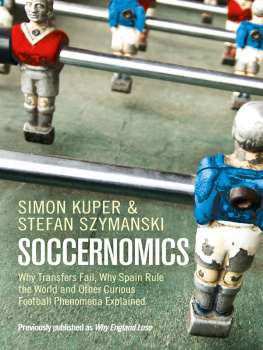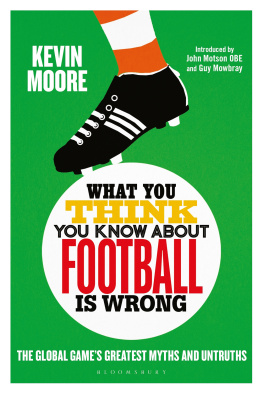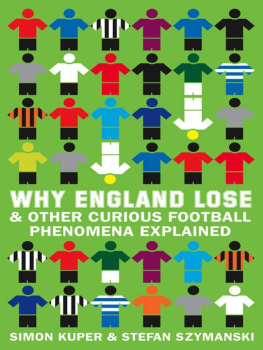From Simon: To Pamela, who doesnt know about football, but knows about writing; for her astonishing tolerance. And to Leila, Leo and Joey, for many hundreds of smiles.
From Stefan: to my father. We never saw eye to eye, but he taught me to question everything.
Not long ago, the data department at a very big English club carried out a study of corner-kicks. The club hadnt been scoring much from corners recently, and the analysts wanted to find out the best way to take them. They watched more than 400 corners, from different leagues, over several seasons, and concluded: the most dangerous corner was the inswinger to the near post.
The beauty of the inswinger was that it sent the ball straight into the danger zone. Sometimes an attacker would get a head or foot to it and divert it in from point-blank range. Sometimes the keeper or a defender stopped the inswinger on the line, whereupon someone bashed it in. And occasionally the ball just swung straight in from the corner. All in all, the analysts found, inswingers were better than outswingers.
They took their findings to the clubs manager, who like almost all managers is an ex-footballer. He heard the analysts out. Then he said, I was a player for many years, and I just know that the outswinger is more effective. He was wrong, but we can understand why he made the mistake: outswingers tend to create beautiful goals (ball swings out, player meets it with powerful header, ball crashes into net) and beautiful goals stick in the memory. The messy goals generally produced by inswingers dont.
Its a story that captures where soccer is today. On the one hand, the March of the Geeks has advanced fast since 2009 when we first published Why England Lose (now renamed, updated and expanded as Soccernomics ). Football is becoming more intelligent. The new analysts who crunch match data at almost all big European clubs (and at many smaller ones) are just one symptom of the shift. Todays plugged-in clubs know stats like pass-completion rates in the final third of the field, kilometres run, and pace of sprints for all their players. These numbers increasingly inform decisions on which players to buy and sell.
On the other hand, as that managers certainty about corner-kicks shows, there is still widespread suspicion of numbers in football. John Coulson of the data provider Opta says: There are still maybe a lot of teams that view data as a threat rather than as a tool. Baseball has had its Moneyball revolution, but in football the change is only just starting. This new edition of our book uses data to clarify thinking on topics ranging from tackles through transfers to the rise of Spain.
This book began in the Hilton in Istanbul. From the outside its a squat and brutalist place, but once the security men have checked your car for bombs and waved you through, the hotel is so soothing you never want to go home again. Having escaped the 13-million-person city, the only stress is over what to do next: a Turkish bath, a spot of tennis or yet more overeating while the sun sets over the Bosphorus? For aficionados, theres also a perfect view of the Besiktas football stadium right next door. And the staff are so friendly they are even friendlier than ordinary Turkish people.
The two authors of this book, Stefan Szymanski (a sports economist) and Simon Kuper (a journalist), met here. Fenerbahce football club was marking its centenary by staging the 100th Year Sports and Science Congress, and had flown us both in to give talks.
Simons talk was first. He said he had good news for Turkish football: as the countrys population mushroomed, and its economy grew, the national team was likely to keep getting better. Then it was Stefans turn. He too had good news for Turkey. As the countrys population mushroomed, and its economy grew, the national team was likely to keep getting better. All this may, incidentally, have been lost on the not very Anglophone audience.
The two of us had never met before Istanbul, but over beers in the Hilton bar we confirmed that we did indeed think much the same way about football. Stefan as an economist is trained to torture the data until they confessed, while Simon as a reporter tends to go around interviewing people, but those were just surface differences. We both think that much in football can be explained, even predicted, by studying data especially data found outside football.
For a very long time football escaped the Enlightenment. Football clubs are still mostly run by people who do what they do because they have always done it that way. These people used to know that black players lacked bottle, and they therefore overpaid for mediocre white players. Today they discriminate against black managers, buy the wrong players, and then let those players take penalties the wrong way. (We can, incidentally, explain why Manchester United won the penalty shootout in the Champions League final in Moscow. Its a story involving a secret note, a Basque economist, and Edwin van der Sars powers of detection.) Entrepreneurs who dip into football also keep making the same mistakes. They buy clubs promising to run them like a business, and disappear a few seasons later amid the same public derision as the previous lot. Fans and journalists arent blameless either. Many newspaper headlines rest on false premises: Newcastle Land World Cup Star, or World Cup Will Be Economic Bonanza. The game is full of unexamined clichs: Football is becoming boring because the big clubs always win, Football is big business, and, perhaps the greatest myth in the English game, The England team should do better. None of these shibboleths has been tested against the data.
Most male team sports are pervaded by the same overreliance on traditional beliefs. American baseball, too, was until very recently an old game filled with old lore. Since forever players had stolen bases, hit sacrifice bunts, and been judged on their batting averages. Everyone in baseball just knew that all this was right.
But that was before Bill James. Like Dorothy in The Wizard of Oz , James came out of rural Kansas. He hadnt done much in life beyond keeping the stats in the local Little League, and watching the furnaces in a pork-and-beans factory. However, in his spare time he had begun to study baseball statistics with a fresh eye, and discovered that a great portion of the sports traditional knowledge is ridiculous hokum. James wrote that he wanted to approach the subject of baseball with the same kind of intellectual rigor and discipline that is routinely applied, by scientists great and poor, to trying to unravel the mysteries of the universe, of society, of the human mind, or of the price of burlap in Des Moines.
In self-published mimeographs masquerading as books, the first of which sold 75 copies, James began demolishing the games myths. He found, for instance, that the most important statistic in batting was the rarely mentioned on-base percentage how often a player managed to get on base. James and his followers (statisticians of baseball who came to be known as sabermetricians) showed that good old sacrifice bunts and base-stealing were terrible strategies.
His annual Baseball Abstracts turned into real books; eventually they reached the bestseller lists. One year, the cover picture showed an ape, posed as Rodins The Thinker , studying a baseball. As James wrote in one Abstract : This is outside baseball. This is a book about what baseball looks like if you step back from it and study it intensely and minutely, but from a distance.














